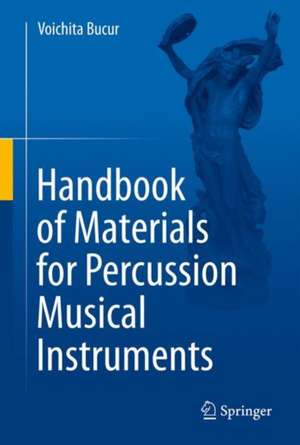Handbook of Materials for Percussion Musical Instruments
Autor Voichita Bucuren Limba Engleză Hardback – 8 iul 2022
Preț: 1698.32 lei
Preț vechi: 2071.13 lei
-18% Nou
Puncte Express: 2547
Preț estimativ în valută:
324.100€ • 339.74$ • 274.64£
324.100€ • 339.74$ • 274.64£
Carte tipărită la comandă
Livrare economică 07-21 martie
Preluare comenzi: 021 569.72.76
Specificații
ISBN-13: 9783030986490
ISBN-10: 3030986497
Pagini: 1042
Ilustrații: XIX, 1042 p. 617 illus., 512 illus. in color.
Dimensiuni: 155 x 235 mm
Greutate: 1.74 kg
Ediția:1st ed. 2022
Editura: Springer International Publishing
Colecția Springer
Locul publicării:Cham, Switzerland
ISBN-10: 3030986497
Pagini: 1042
Ilustrații: XIX, 1042 p. 617 illus., 512 illus. in color.
Dimensiuni: 155 x 235 mm
Greutate: 1.74 kg
Ediția:1st ed. 2022
Editura: Springer International Publishing
Colecția Springer
Locul publicării:Cham, Switzerland
Cuprins
Preface.- PART 1 Classification and sound of percussion instruments.- Chapter 1 Introduction.- Chapter 2 Organology of percussion instruments for the classic symphony orchestra.- Chapter 3 About the sound of percussion instruments.- Chapter 4 Methodology for percussion instruments testing.- PART 2 Structural parts of the Instruments.- Chapter 5 Materials for membranophones - timpani, drums, tambourine.- Chapter 6. Idiophones made of wood and played with mallets: marimba and xylophone.- Chapter 7 Metallic idiophones played with mallets.- Chapter 8. Struck idiophones played with mallets: gongs, cymbals, chimes, bell plates, triangle.- Chapter 9 The Mallets.- Chapter 10 The carillon.- Chapter 11 A percussion idiophone instrument with keyboard: the celesta.- Chapter 12 Concussion idiophones.- Chapter 13 New Percussion Instruments.- PART 3 Properties of Materials.- Chapter 14 Properties of wood species for percussion instruments.- Chapter15 Metallic alloys for percussion instruments.- Chapter 16 Leather for percussion instruments.- Chapter 17 New materials for percussion instruments.- PART 4 Maintenance and conservation of percussion instruments.- Chapter18. Care, maintenance and restoration of percussion instruments.- Chapter 19 Conservation of percussion instruments.- Chapter 20 Patents for percussion instruments.
Recenzii
“This book contains new features … and is of great interest for the musical acoustics community. … Another appreciable specificity of the book is the high number of clear pictures and figures of wonderful quality … . this book is a compulsory starting point for any future research on percussion instruments, and should be usefully associated with other books and publications more specialized in physical modeling. The references are extensive and beyond the usual references lists in musical acoustics.” (Antoine Chaigne, EAA Newsletter Nuntius, euracoustics.org, January-February, 2023)
Notă biografică
Dr. Voichita Bucur, currently an adjunct professor at RMIT Melbourne, Australia, received her bachelor in Engineering in 1962 from Polytechnic Institute Brasov, Romania, and her PhD in Mechanics and Ultrasonics in 1984 from the Institut Supérieur des Materiaux, St Ouen, Paris today named Institut Superieur de Mecanique de Paris, France. Her fields of research encompass development of non-destructive techniques (vibrational, acoustic, ultrasonic, X-rays) for the assessment of the quality of trees, wood products and wood-based composites, mechanical characterisation of materials with non-destructive techniques, wood science and technology, and mechanical characterisation of wood for musical instruments. In 2004, she was awarded the silver medal by Société d’Encouragement du Progrès, France, for contributions to mechanics, acoustics, wood science, education and service to the society. In 2007, she received the distinguish award at 15th International Symposium on Non-destructive Testing of wood, Duluth, Minessota, USA, for contribution to the development of non-destructive techniques for wood and wood-based composites
Textul de pe ultima copertă
This book describes the properties of materials used for making percussion instruments for classical music played by a symphony orchestra in which the instruments could be played as a soloist instrument or as a group or several groups of instruments, as they are included into a musical work. A chapter is devoted to the bells. The scope of this book is primarily confined to percussion instruments of symphony orchestras taking into account the centuries of musical art and tradition. This book bridges the gap in the technical literature on describing the properties of materials for percussion instruments—timpani, other drums, marimba, xylophone, vibraphone, gong, cymbal, triangle, celesta, castanets.
Caracteristici
Describes the properties of materials used for making percussion instruments Covers percussion instruments of the symphony orchestras Special chapter devoted to bells
